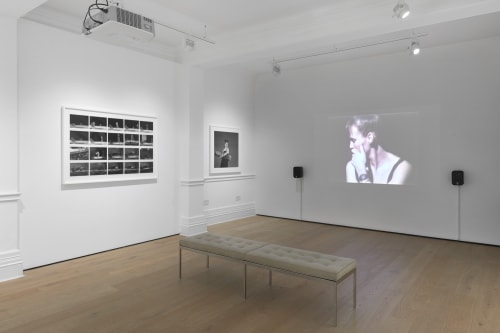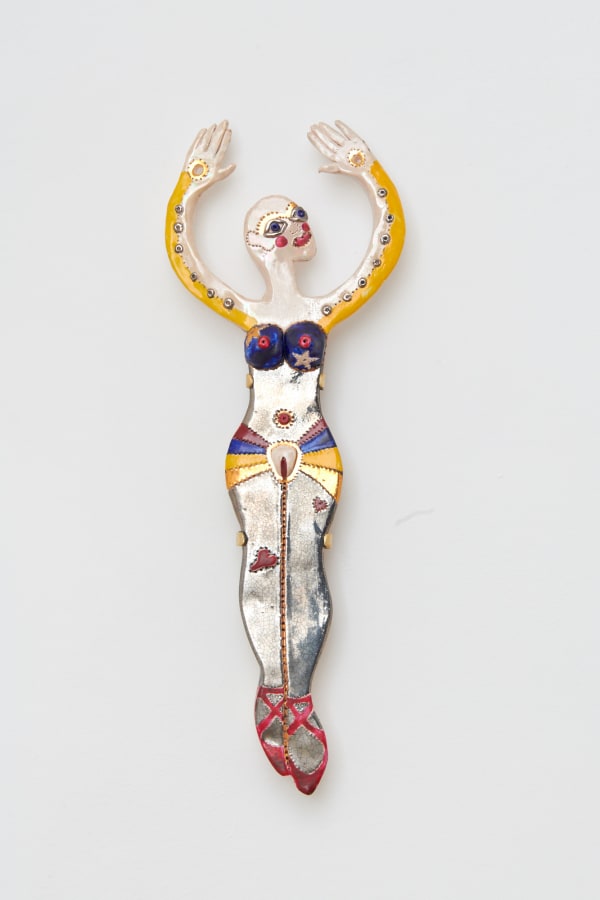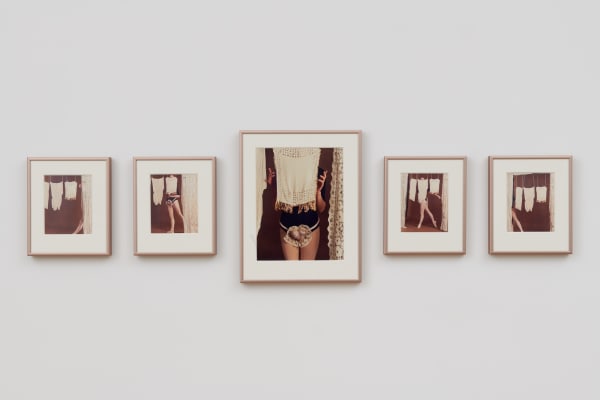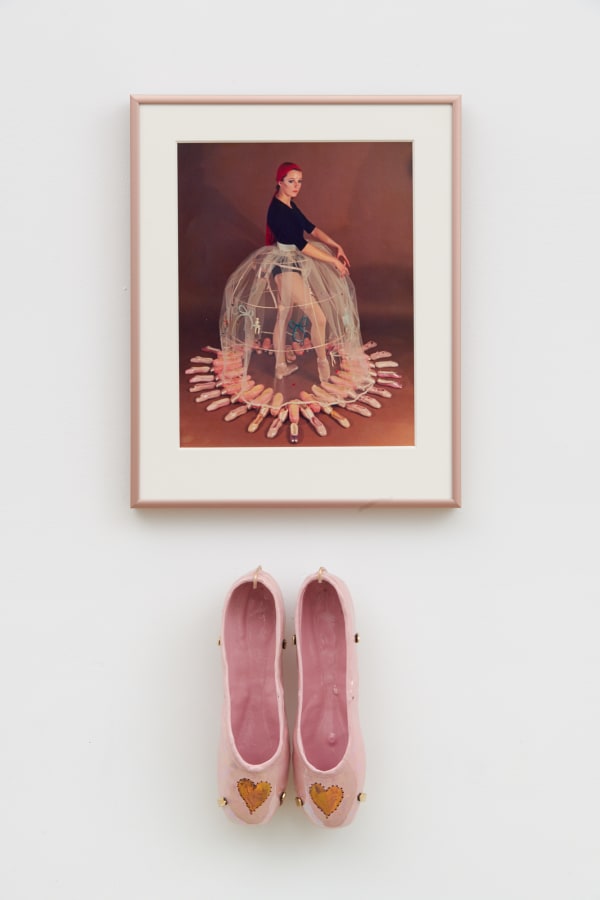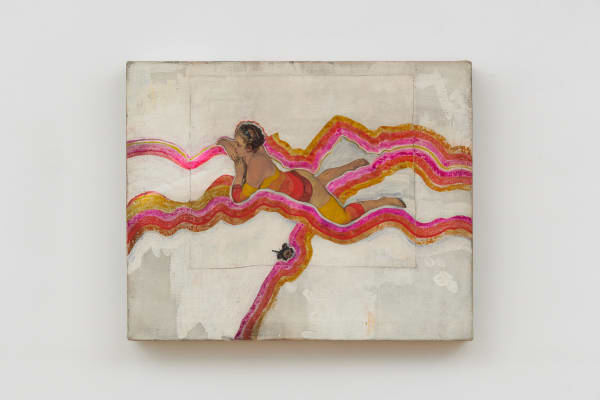Rose ENGLISH: Form, Feminisms, Femininities
'Form, Feminisms, Femininities' is Rose ENGLISH's first solo exhibition with Richard Saltoun Gallery. The exhibition shines light on two moments from the early stages of the artist's career, beginning with her experimentation with emergent processes and materials as a young artist in the early 1970s and culminating with a focus on her 1983 performance Plato's Chair, a work that marked an important turning point in English's extensive interdisciplinary practice. The exhibition will present for the first time several early works in photography, ceramics, collage and performance to camera, providing a unique opportunity to more fully engage with different aspects of the artist’s work.
-
 Rose ENGLISHStudy for A Divertissement: Jo and Porcelain Cache-Sexe, 1973Cibachrome photograph43.5 x 33.5 cmEdition 1 of 5 plus 3 AP'sSold
Rose ENGLISHStudy for A Divertissement: Jo and Porcelain Cache-Sexe, 1973Cibachrome photograph43.5 x 33.5 cmEdition 1 of 5 plus 3 AP'sSold -
 Rose ENGLISHBed in Field, 1971Set of 7 gelatin silver prints, one coloured15 x 22 cm
Rose ENGLISHBed in Field, 1971Set of 7 gelatin silver prints, one coloured15 x 22 cm
15 x 19 cm
17 x 12 cm (2 photos)
18 x 26 cm
21 x 26 cm (2 photos) -
 Rose ENGLISH, Baroque Harriet study (feather mattress), 1973
Rose ENGLISH, Baroque Harriet study (feather mattress), 1973 -
 Rose ENGLISHPlato's Chair, 1983InstallationVariable dimensions
Rose ENGLISHPlato's Chair, 1983InstallationVariable dimensions -
 Rose ENGLISHPorcelain Dancer 1, 1973Porcelain, enamel colours with gold and silver22.9 x 17.8 x 2.5 cm
Rose ENGLISHPorcelain Dancer 1, 1973Porcelain, enamel colours with gold and silver22.9 x 17.8 x 2.5 cm -
 Rose ENGLISH, Porcelain Dancer 2, 1973
Rose ENGLISH, Porcelain Dancer 2, 1973 -
 Rose ENGLISHStudy for a Divertissement: Diana and Porcelain Lace Veil, 1973Set of 5 c-prints, vintageUnframed: x1 - 25 x 20 cm
Rose ENGLISHStudy for a Divertissement: Diana and Porcelain Lace Veil, 1973Set of 5 c-prints, vintageUnframed: x1 - 25 x 20 cm
Unframed: x4 - 14 x 11 cm
Framed: x1 - 33 x 26 x 2 cm
Framed: x4 - 21.1 x 17.5 x 2 cm -
 Rose ENGLISH, Study for a Divertissement: Diana with crinoline and pointe shoes I, 1973
Rose ENGLISH, Study for a Divertissement: Diana with crinoline and pointe shoes I, 1973 -
 Rose ENGLISH, Untitled (Miss O’Murphy), 1969
Rose ENGLISH, Untitled (Miss O’Murphy), 1969
'Form, Feminisms, Femininities' is Rose ENGLISH's first solo exhibition with Richard Saltoun Gallery. The exhibition shines light on two moments from the early stages of the artist's career, beginning with her experimentation with emergent processes and materials as a young artist in the early 1970s and culminating with a focus on her 1983 performance Plato's Chair, a work that marked an important turning point in English's extensive interdisciplinary practice. The exhibition will present for the first time several early works in photography, ceramics, collage and performance to camera, providing a unique opportunity to more fully engage with different aspects of the artist’s work.
The 1970s was an era of political and social upheaval, and it was within this cultural milieu that English first emerged as an artist. She has developed a unique artistic vocabulary that has consistently analysed and commentated on aesthetics, politics, philosophy and form, including aspects of British pop culture, from show girls and show horses to magic acts and pantomime. English's work challenges conventional understandings of both feminism and femininity through the combination of forms with which she engages, including theatre, circus, poetry and fine art, producing acclaimed performances but also works in other media such as film and installation.
Artistically reflexive and self-reflexive, the artist's work has paid close attention to the conventions and histories of these forms. This is evident in early work such as Untitled (Miss O'Murphy) (1969), a collage that incorporates a cut-out of the floating body of Boucher's eponymous painting (1752). For the young English, the sensual exuberance of the baroque is an important site of feminist investigation, as she tenderly sends up its extravagant constraints. The two collage series, Baroque Harriet and Baroque Ruby, reflect the recumbency and horizontality of Boucher's Miss O'Murphy, humorously incorporating English’s own photographs of 20th Century women into rococo settings.
A set of vintage performance to camera photographs entitled Bed in Field (1971), document an early conceptual and performance piece with the artist and her then partner tucked up and sleeping under the wide undulating duvet of a ploughed field. Photographs and ceramics made for and deriving from another early performance, A Divertissement (1973), are also elements of this exhibition and offer insights into the origins of making things that lies at the root of the artist's oeuvre.
The final room of the gallery is given over to one of English's most important early monologue performances, Plato's Chair (1983) and features a video of the performance staged at the Western Front in Vancouver, Canada in 1983. English interrogates a range of words and questions relating to the stage and the conventions of its forms – theatre, opera, dance and spectacle – and their relation to existential thought. The list of keywords and other ephemera, including original collages the artist created as 'audience programmes', will feature in the exhibition alongside a sound installation of multiple variant audio recordings of Plato's Chair performed in other venues. The installation extends the artist's interrogation of the idea of 'the repertoire' – evident in Plato's Chair – to a current meditation on the histories of her own work.[i]
English will be in conversation with Paul Clinton, a writer, curator and editor based in London, on Thursday 11 April. The event is free and open to the public but spaces are limited. Please email rsvp@richardsaltoun.com to book your spot.
With special thanks to Karsten Schubert.
